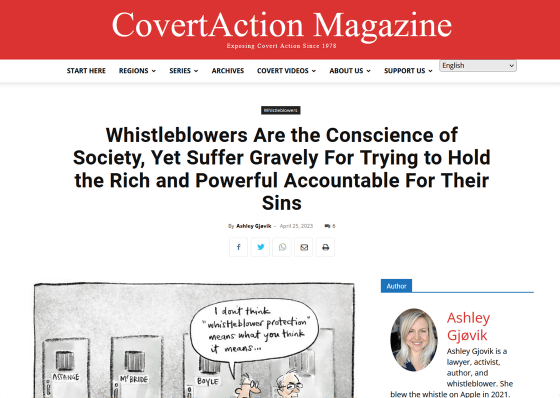Nearly all whistleblowers are harassed and 70% are immediately fired, forced to resign, or even killed.

Whistleblowers, who publicize wrongdoings in companies and organizations, play an important role in correcting the corruption of power and inequality in the world. However, whistleblowers who defy authority are often exposed to severe headwinds and are often dismissed or forced to resign. Therefore, former engineering program manager
Whistleblowers Are the Conscience of Society, Yet Suffer Gravely For Trying to Hold the Rich and Powerful Accountable For Their Sins | CovertAction Magazine
https://covertactionmagazine.com/2023/04/25/whistleblowers-are-the-conscience-of-society-yet-suffer-gravely-for-trying-to-hold-the-rich-and-powerful-accountable- for-their-sins/

“Modern whistleblowers who discover misconduct 'blow the whistle' to inform the public of the threat,” Gjøvik said. He points out that many of the whistleblowing cases are related to socially important matters such as human rights violations and environmental destruction.
So far, several studies have focused on ``What are the tendencies of people who tend to become information leakers?'' A relationship has been pointed out. However, Gjøvik argues that these studies are nonsense that ignores the causes leading to whistleblowing, and that whistleblowing is a moral challenge that everyone can face.
According to Gjøvik, people often carry out whistleblowing because even if they report the problem to their boss, it is not dealt with, and there is no possibility of solving it within the organization. “It is generally said that workers are most likely to file whistleblowers complaints of serious problems or willful misconduct. It's because they were ignored by the company, and in 10% of cases they came forward because the problem was covered up,' Gjøvik said.

Many whistleblowers believe in formal procedures and justice and do not expect a hostile reaction, but in reality they are stigmatized as ``leakers'' and ``whistleblowers''. It is said that there are many cases where personal information is spread.
In the United States, there are laws and protective measures to protect whistleblowers, but in reality they are not useful in eliminating systematic acts that try to forcibly eliminate whistleblowers. “When faced with whistleblowing, organizations instinctively respond to minimize their liability and harm,” Gjøvik said. Investigations are conducted and documented to discredit and attack the whistleblower's character, and the whistleblower is expelled from the organization to 'protect' the bullshit investigation. I will be isolated,” he said.
A 2017
Based on a 2014 study , Gjøvik said, ``Eventually, about 70% of whistleblowers who bring issues outside the company are fired or forced to resign. Retaliation against whistleblowers is common and serious. 'Those who report problems externally and cause adverse publicity can be expected to face 'comprehensive retaliation.''

The most common form of retaliation against whistleblowers is called
This manipulation causes the whistleblower to question his own memory and sanity. In this way, the whistleblower's behavior is inconsistent to outsiders, and it can be seen as an unstable existence.
A 2018 study showed that whistleblowers were at a much higher risk of depression, anxiety and sleep disorders than the rest of the population. 88% of whistleblowers report intrusive thoughts or nightmares where unwanted thoughts arise involuntarily, 89% feel humiliated by their current situation, and 87% feel they have an organized opponent. About. The psychological effects of whistleblowing are comparable to those grieving the loss of a loved one or two to three weeks after experiencing a major natural disaster.
Whistleblowers are also forced into financial hardship by being kicked out of the organizations and companies they depend on for their income. According to a 2021 study , many whistleblowers have to bear the costs of moving and litigation as their income plummets, resulting in an average annual deficit of $30,000 or more. matter. Also, if the income is completely lost due to dismissal, etc., the deficit amount will rise to more than $ 76,000 (about 10 million yen) annually, and even if you return to work, the income will be significantly below the level before the whistleblowing. that's right.

Furthermore, in the worst case, whistleblowers are even killed, and there have been several reports of murders of whistleblowers in the United States. In 2017, just days after Eliud Montoya, who worked for a tree management company, accused the company of employing illegal workers and unfairly exploiting hundreds of millions of yen, the company's Shot dead by a hitman hired by an employee. In 2019, Allyzibeth Lamont, who was trying to accuse the New York State Department of Labor that his restaurant boss cheated on payroll taxes, was beaten to death by a killer hired by his boss.
Of course, violent retaliation against a whistleblower is a high-risk activity for a company, and retaliation such as psychological harassment rather than physical harm and forced resignation is common. However, the psychological impact on whistleblowers is significant, and Gjøvik points out that the American Whistleblower Protection Act has failed to protect whistleblowers. Gjøvik argues that whistleblowers can be witnesses and informants for regulators who ultimately punish companies and deserve the same protections as informants assisting the Justice Department in criminal investigations. Did.
Related Posts:
in Note, Posted by log1h_ik







